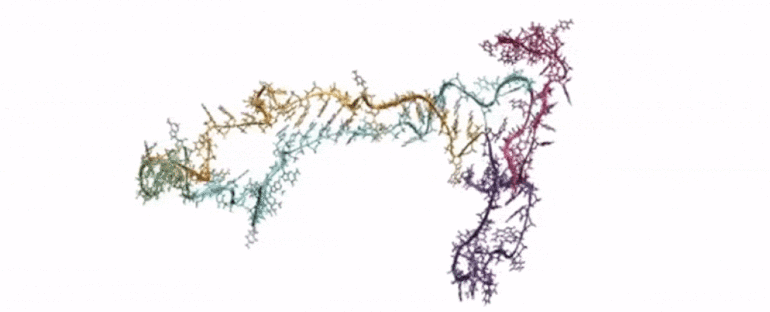Striking new videos show how RNA – the genetic molecule that tells cells how to build proteins – tangles up in insane knots as it forms, only to disentangle itself at the last second, and in a way that took scientists by surprise.
The high-resolution videos depict a bouncing conga line of nucleotides, the building blocks of RNA; as the single strand of RNA grows longer, these nucleotides dance and twist into different three-dimensional shapes, wiggling first into one conformation and then another.
Once fully assembled, the RNA assumes its final shape, which dictates how it can interact with other molecules and proteins in the cell.
But on the way, the RNA can get trapped in “knots” that must be undone for this final shape to emerge.
“So the RNA has to get out of it,” said study author Julius Lucks, an associate professor of chemical and biological engineering and a member of the Center for Synthetic Biology at Northwestern University.
The RNA won’t function correctly if it remains trapped in the wrong knot, meaning a knot that gets in the way of its final shape, he said. “What was surprising is how it got out of that trap. … This was only discovered when we had the high-resolution videos.”
In the new study, published Jan. 15 in the journal Molecular Cell, Lucks and his colleagues generated their videos of RNA using experimental data and a computer algorithm. The goal was to zoom in on how RNA forms, both to better understand basic cell biology and to pave the way to better treatments for RNA-related diseases.
In the experiments, the team used a specific kind of RNA called signal recognition particle (SNP) RNA, an evolutionarily ancient molecule found across all kingdoms of life. They used this RNA as a model since it serves a fundamental function in many kinds of cells.
To zoom in on how cells build this RNA, the team used chemicals to pause the construction process. So as new nucleotides got added to the RNA, the researchers hit pause and then recorded how those nucleotides interacted with others already in the lineup, and what shapes they all formed together.
By capturing the data from many individual RNA molecules, the team developed snapshots of how RNA generally builds itself through time.
These snapshots served as individual frames in what would become their final videos of RNA formation. That’s where the computer model came in. The algorithm essentially strung together the individual frames into mini-movies and filled in the gaps between frames with the most likely nucleotide interactions.
In these videos, the team noticed how the RNA got tangled into complex knots that, if left tied, would render the whole molecule useless.
“It folds into this trap state, and it kind of stays there,” Lucks said.
SNP RNA is meant to form in a signature “hairpin-like” shape, and these traps seem to get in the way. But as more nucleotides get added to the sequence, the new nucleotides swoop in to unravel the knot by displacing the nucleotides tangled up inside.
“That last little nucleotide is like a trigger” that allows the whole RNA to pop into the correct conformation, Lucks said.
Think of the last fold in an origami project, which suddenly transforms a crinkly piece of paper into a lovely butterfly. In the videos, the nucleotides highlighted in dark purple knot themselves up, and the dark pink nucleotides help free them, Lucks noted.
Learning how RNA tangles and untangles is key to understanding how cells function and how proteins form; the research can also help address diseases where RNA doesn’t function properly or a specific protein can’t form, such as spinal muscular atrophy, and infectious diseases such as COVID-19 that are caused by RNA viruses, according to a statement.
A big question is whether RNA can mostly untangle itself from these knots, or whether it sometimes needs helper proteins to ease the process. It’s possible that some proteins act as so-called “RNA chaperones” and help sculpt the molecule into its final form, Lucks said. He added that it may be a combination of both, although at this point, that’s speculative.
This article was originally published by Live Science. Read the original article here.



